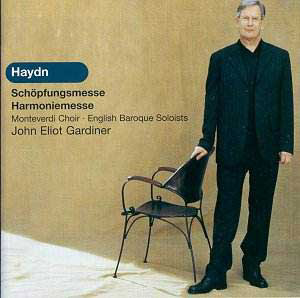This is the first issue in what promises to be a fine series
of the late Haydn masses by Gardiner and his forces. Haydn’s last six
masses are at least comparable with the twelve Salomon symphonies in terms
of their greatness and musical inventiveness. Like many of the symphonies,
they too carry tantalising soubriquets. In the case of the two recorded
here, one nickname is trivial, the other a valid description. The former
is the "Creation Mass", which owes this appellation to a fleeting
reference to a duet from Haydn’s own oratorio, The Creation. This
quotation crops up in the Gloria of the mass, and apparently caused
Haydn some difficulty with the Empress Maria Thérèse. She
insisted on its excision (incidentally Richard Hickox’s excellent recording
includes a performance of the Gloria in this bowdlerised version).
The title Harmoniemesse should be translated
as ‘Wind-Band Mass’, and refers to the large and prominently used wind
section in the work. This is Haydn’s final mass, and surely one of his
supreme achievements. I have long been an admirer of John Eliot Gardiner’s
conducting of choral and orchestral music, and found his version of
the Beethoven Missa Solemnis to be ideal. These Haydn works provide
the context for a fuller understanding of Beethoven’s later masterpiece.
Many of the expressive emphases and touches of word-painting indicate
a tradition that went back to Bach and beyond, and of which the Missa
Solemnis was arguably the final summit.
Gardiner has used quite different quartets of soloists
for the two works, both excellent and well balanced. In each mass, the
soprano has the larger part of the limelight, though not as prominently
as in the Nelson Mass. My own preference here is for the slightly
stronger colouring Ruth Ziesak. She brings real authority and dignity
to the opening of the Schöpfungmesse. Joanne Lunn is very
sweet-toned, but rather too reticent for this very direct music. On
the other hand, Brindley Sherratt, a bass of impeccable credentials
and educational background, is in fine voice in the Harmoniemesse,
while Sara Margado brings delightfully supple phrasing to the Gratias
agimus solo.
The Monteverdi Choir are in fine voice throughout both
masses. Gardiner has encouraged them to produce big, imposing sounds
for such movements as the Kyrie of the Harmoniemesse or
the Crucifixus of the Schöpfungmesse. Yet
in the gloriously athletic fugal sections that crop up regularly in
each work, they sing with fabulous lightness and suppleness, attentive
to every expressive twist in the music. The English Baroque Soloists,
playing on period instruments of course, are as stylish as you would
expect. I fear I have to admit, though, to being disappointed in the
tone of the woodwind soloists. I’m not sure if it’s the players or the
recording that is to blame, but many of the delightful details of scoring
are either indistinct or pretty well inaudible. Horns, trumpets and
drums, on the other hand, come over to fine effect.
The speeds are often on the brisk side - indeed, some
listeners may be taken aback by the extremely quick speed for the Benedictus
in the Harmoniemesse. I love it at this speed; the music
acquires an irresistibly jazzy bounce, and Haydn has after all marked
it Allegro molto (‘very fast’). To balance this, Gardiner has
set appropriately broad tempi for passages such as the opening Kyrie
in each piece.
If you are not familiar with these late Haydn masses,
surely among the pinnacles of Western sacred music, now seems the perfect
time to make their acquaintance, as Gardiner and company begin this
important new venture.
Gwyn Parry-Jones


